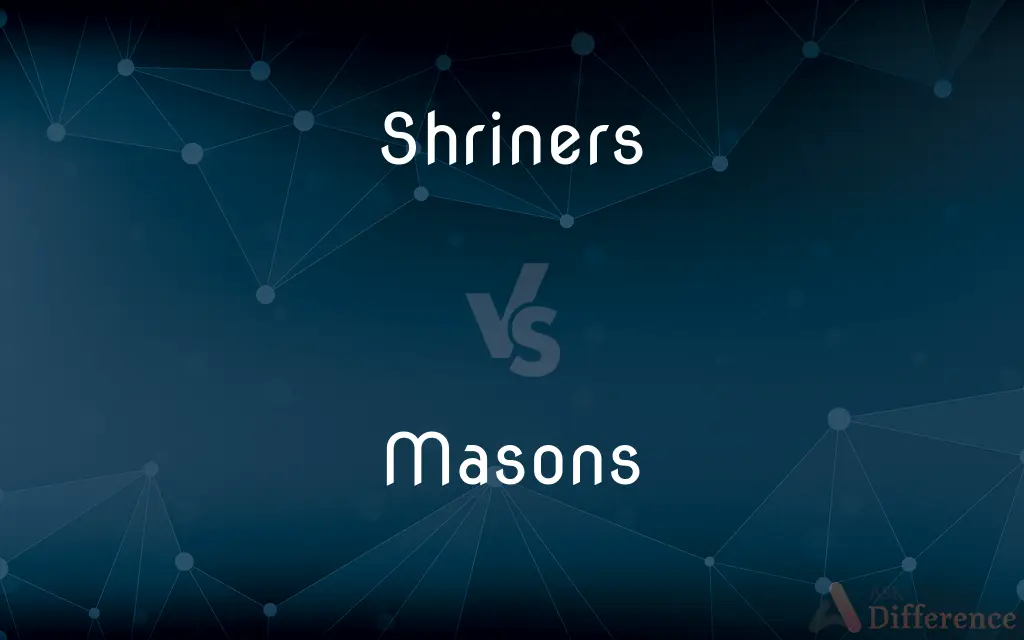Shriners vs. Masons — What's the Difference?
By Tayyaba Rehman — Published on January 24, 2024
Shriners are a subgroup of Masons known for charitable work, especially children's hospitals; Masons are members of a larger fraternal organization focused on moral and spiritual values.

Difference Between Shriners and Masons
Table of Contents
ADVERTISEMENT
Key Differences
Shriners, formally known as the Ancient Arabic Order of the Nobles of the Mystic Shrine, is an organization formed by Masons. Masons, or Freemasons, are part of a larger, older fraternal organization with a focus on moral, ethical, and spiritual development.
The Shriners are known for their philanthropic efforts, particularly their network of children's hospitals. The Masons, while also engaged in charitable work, have a broader focus on personal growth, community service, and fraternal fellowship.
Membership in the Shriners is exclusive to Masons who have reached the Master Mason level. The Masonic fraternity, however, is open to all men who meet their criteria, irrespective of race, religion, or social status.
The Shriners are distinct in their cultural symbols, like the red fez, and are known for their parades and distinctive style. Masons, on the other hand, are recognized for their secretive meetings, symbols, and rituals rooted in historical stonemasonry.
While Shriners focus heavily on children's medical needs and fun, community-facing activities, Masons are more centered on philosophical discussions, moral teachings, and internal community building.
ADVERTISEMENT
Comparison Chart
Primary Focus
Philanthropy, especially children's hospitals
Moral and spiritual development
Membership Requirement
Must be a Master Mason
Open to all qualifying men
Notable Activities
Parades, children's hospitals
Secretive meetings, community service
Symbols
Red fez, fun activities
Masonic symbols, rituals
Key Characteristics
Subgroup of Masons, more visible philanthropy
Larger fraternal organization, philosophical focus
Compare with Definitions
Shriners
Masons who have achieved Master Mason status and focus on charitable work.
He became a Shriner after reaching the Master Mason level.
Masons
A fraternity that values personal development, ethics, and philanthropy.
Through the Masons, he found a strong sense of community and personal growth.
Shriners
An organization emphasizing fun and community service.
The local Shriners chapter hosted a community carnival.
Masons
Known for their secretive meetings, rituals, and community service.
Masons are often recognized for their discreet and symbolic gatherings.
Shriners
Recognizable by their red fezzes and participation in parades.
The Shriners in their red fezzes added excitement to the parade.
Masons
An inclusive organization open to all men meeting specific moral and ethical criteria.
The Masons pride themselves on welcoming members from diverse backgrounds.
Shriners
A fraternity within Freemasonry dedicated to helping children.
Shriners are renowned for their commitment to pediatric care.
Masons
Members of a fraternal organization focused on moral and spiritual values.
The Masons meet regularly to discuss ethical and philosophical topics.
Shriners
A Masonic subgroup known for philanthropy and children's hospitals.
The Shriners organized a fundraiser for their children's hospital.
Masons
A group with historical roots in stonemasonry, now a moral brotherhood.
Masons trace their symbolic practices back to medieval stonemasons.
Shriners
A member of a US secret fraternal order that is not Masonic but that admits only Knights Templars and 32nd-degree Masons as members.
Masons
One who builds or works with stone or brick.
Masons
Mason A Freemason.
Masons
To build of or strengthen with masonry.
Masons
Plural of mason
Common Curiosities
What are Masons?
Masons are members of the Freemasons, a fraternal organization focused on moral, spiritual, and ethical development.
What is the primary focus of the Masons?
The primary focus of Masons is on moral and spiritual growth, community service, and fraternal fellowship.
Can anyone become a Shriner?
Only Masons who have reached the Master Mason level can become Shriners.
What is the most well-known activity of the Shriners?
The most well-known activity of the Shriners is their support and operation of children's hospitals.
Do Masons have secret rituals?
Yes, Masons are known for their secretive meetings and rituals, which are rooted in historical stonemasonry.
How old is the Masonic fraternity?
The Masonic fraternity has historical roots dating back several centuries, with modern Freemasonry originating in the late 16th to early 17th century.
Who are the Shriners?
Shriners are a subgroup within the Masonic fraternity, known for their philanthropic work, especially for children's hospitals.
What symbol is most associated with the Shriners?
The red fez hat is the most recognizable symbol associated with the Shriners.
Are the Shriners a religious organization?
No, the Shriners, like the Masons, are not a religious organization, but members are expected to believe in a supreme being.
What kind of charitable work do Masons do?
Masons engage in various forms of charitable work, including community service and supporting different philanthropic causes.
Is membership in the Masons necessary to join the Shriners?
Yes, membership in the Masons and reaching the Master Mason level is a prerequisite for joining the Shriners.
Do the Masons and Shriners have different initiation processes?
Yes, the Masons and Shriners have distinct initiation processes, with the Shriners requiring prior Masonic membership.
Can women join the Shriners or Masons?
Traditionally, both the Shriners and Masons are male-only organizations, although there are related organizations for women.
Do the Shriners participate in community events?
Yes, the Shriners are well-known for their participation in community events, especially parades.
What are the requirements to become a Mason?
Requirements to become a Mason typically include being a man of legal age, belief in a supreme being, and meeting moral and ethical standards.
Share Your Discovery

Previous Comparison
Active Transducer vs. Passive Transducer
Next Comparison
4L60E vs. 4L80EAuthor Spotlight
Written by
Tayyaba RehmanTayyaba Rehman is a distinguished writer, currently serving as a primary contributor to askdifference.com. As a researcher in semantics and etymology, Tayyaba's passion for the complexity of languages and their distinctions has found a perfect home on the platform. Tayyaba delves into the intricacies of language, distinguishing between commonly confused words and phrases, thereby providing clarity for readers worldwide.












































